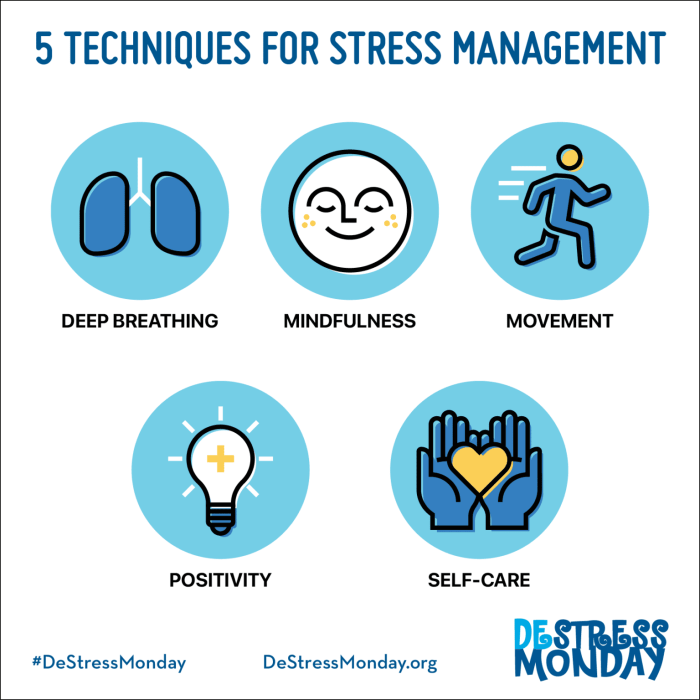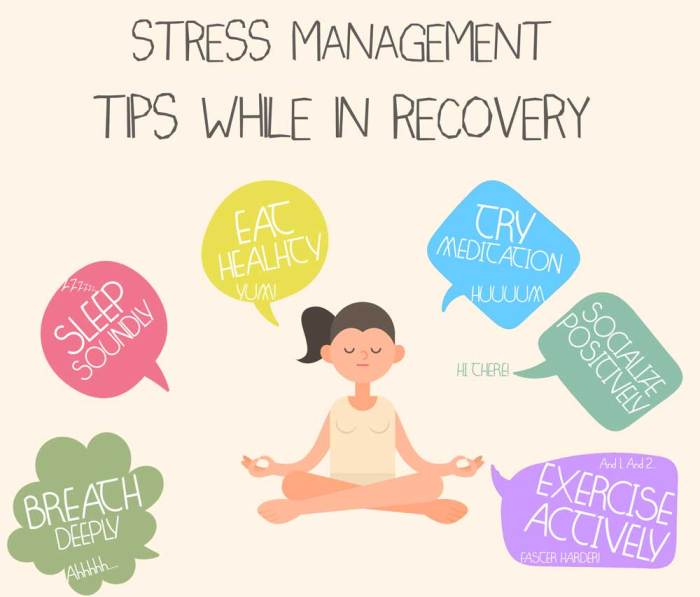Stress Management Tips takes center stage with a cool vibe, offering insights into how to keep calm and collected in the face of life’s challenges. From healthy habits to time management strategies, this guide has you covered.
Dive into the world of stress management and discover effective ways to tackle stress head-on with these practical tips and techniques.
Introduction to Stress Management Tips
Stress is a natural response to challenges or demands in life that can affect both our mental and physical health. It can manifest in various ways and impact our overall well-being if not properly managed. Recognizing the signs and symptoms of stress is crucial in taking steps towards effective stress management.
Common Signs and Symptoms of Stress
- Feeling overwhelmed or constantly worried
- Difficulty concentrating or making decisions
- Irritability or anger issues
- Changes in appetite or sleeping patterns
- Physical symptoms like headaches or muscle tension
Healthy Lifestyle Habits for Stress Management

Regular exercise plays a crucial role in reducing stress levels. When you engage in physical activity, your body releases endorphins, which are known as the “feel-good” hormones. These endorphins help to combat stress and improve your mood.
Importance of a Balanced Diet
Maintaining a balanced diet is essential for stress management. Eating a variety of nutrient-rich foods provides your body with the necessary vitamins and minerals to support overall well-being. A healthy diet can help regulate your mood and energy levels, reducing the impact of stress on your body.
Benefits of Adequate Sleep, Stress Management Tips
Getting enough sleep is vital for stress reduction. Lack of sleep can lead to increased levels of cortisol, the stress hormone, causing irritability and decreased cognitive function. Aim for 7-9 hours of quality sleep each night to improve your resilience to stress.
Relaxation Techniques
Incorporating relaxation techniques like meditation and yoga into your daily routine can help alleviate stress. These practices promote mindfulness, reduce anxiety, and enhance your ability to cope with stressful situations. Take time each day to unwind and focus on relaxation to improve your overall well-being.
Time Management Strategies to Reduce Stress
Effective time management plays a crucial role in reducing stress levels. By managing your time efficiently, you can prioritize tasks, set realistic goals, and create a structured schedule that can help you cope with stress better.
Techniques for Prioritizing Tasks
- Make a to-do list: Write down all the tasks you need to accomplish and prioritize them based on urgency and importance.
- Use the ABCDE method: Assign each task a letter from A to E based on priority, where A tasks are the most important and E tasks can be postponed or delegated.
- Focus on one task at a time: Avoid multitasking and concentrate on completing one task before moving on to the next.
Benefits of Setting Realistic Goals and Deadlines
- Reduce overwhelm: Realistic goals help break down tasks into manageable steps, making them less daunting.
- Boost motivation: Achieving smaller goals within set deadlines can boost confidence and motivation to tackle bigger tasks.
- Improve efficiency: Setting deadlines creates a sense of urgency that can help you stay focused and productive.
Tips for Creating a Daily or Weekly Schedule
- Block out time for important tasks: Allocate specific time slots for high-priority tasks to ensure they get done.
- Include breaks: Schedule short breaks between tasks to rest and recharge, preventing burnout.
- Review and adjust: Regularly review your schedule to make necessary adjustments and ensure you are on track to meet your goals.
Social Support and Stress Management

In times of stress, having a strong social support system can make a significant difference in how we cope with challenges. Connecting with others, whether it be friends, family, or support groups, can provide comfort, understanding, and practical help to manage stress effectively.
The Importance of Social Connections
- Engaging with supportive relationships can reduce feelings of isolation and loneliness, which are common triggers for stress.
- Sharing experiences with others can offer fresh perspectives and insights, helping to navigate difficult situations more effectively.
- Feeling valued and cared for by those around you can boost your confidence and resilience in facing stressors.
Effective Communication and Setting Boundaries
- Open and honest communication is key in building strong relationships that can provide emotional support during stressful times.
- Setting clear boundaries with others can help prevent added stress from unhealthy dynamics or conflicts.
- Expressing your needs and concerns respectfully can lead to a deeper understanding and mutual support within relationships.
Seeking Professional Help
- If stress becomes overwhelming and begins to interfere with your daily life, seeking help from a therapist, counselor, or mental health professional can be beneficial.
- Professional guidance can offer personalized strategies and tools to manage stress effectively and improve overall well-being.
- Don’t hesitate to reach out for professional support when needed, as taking care of your mental health is essential for overall wellness.